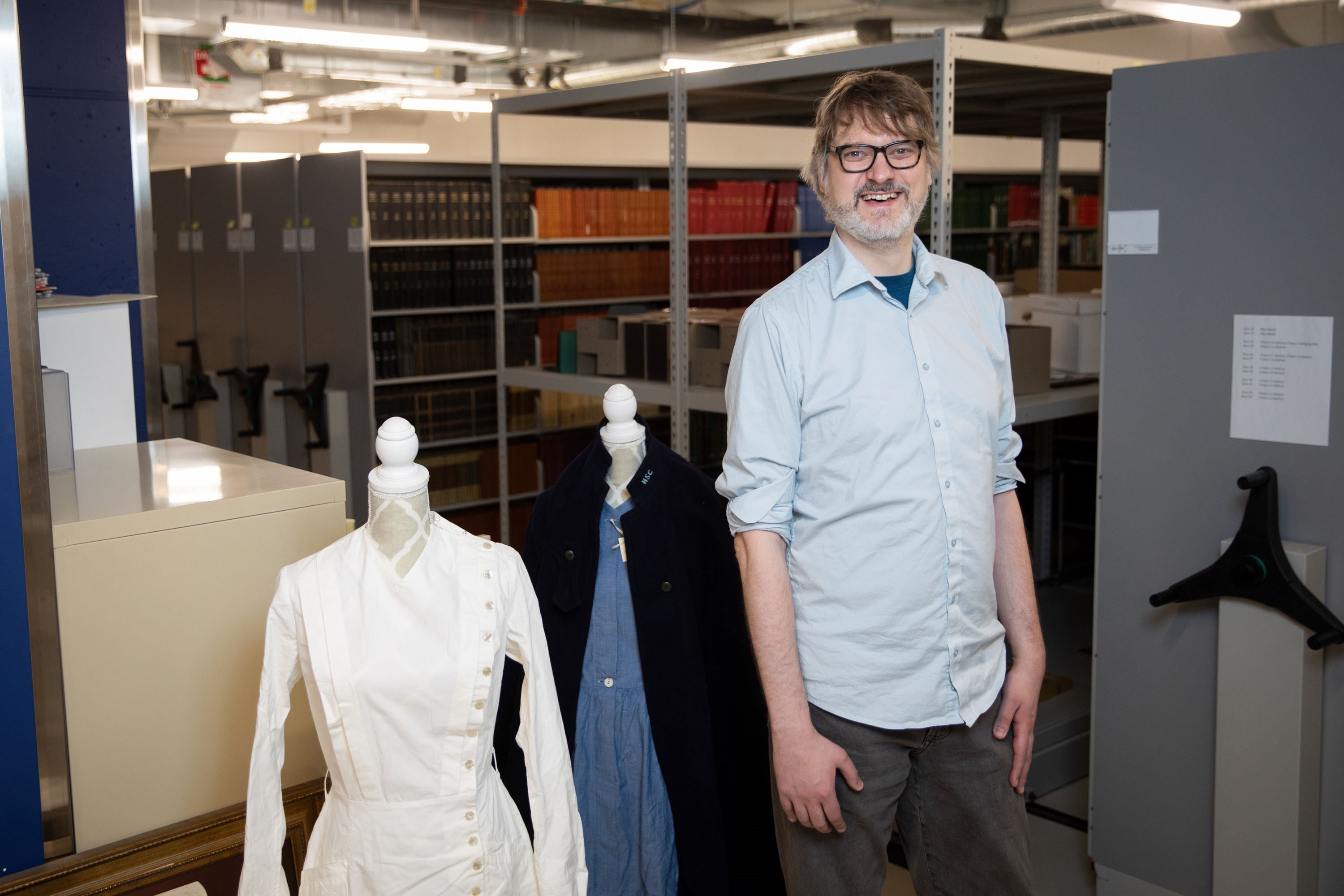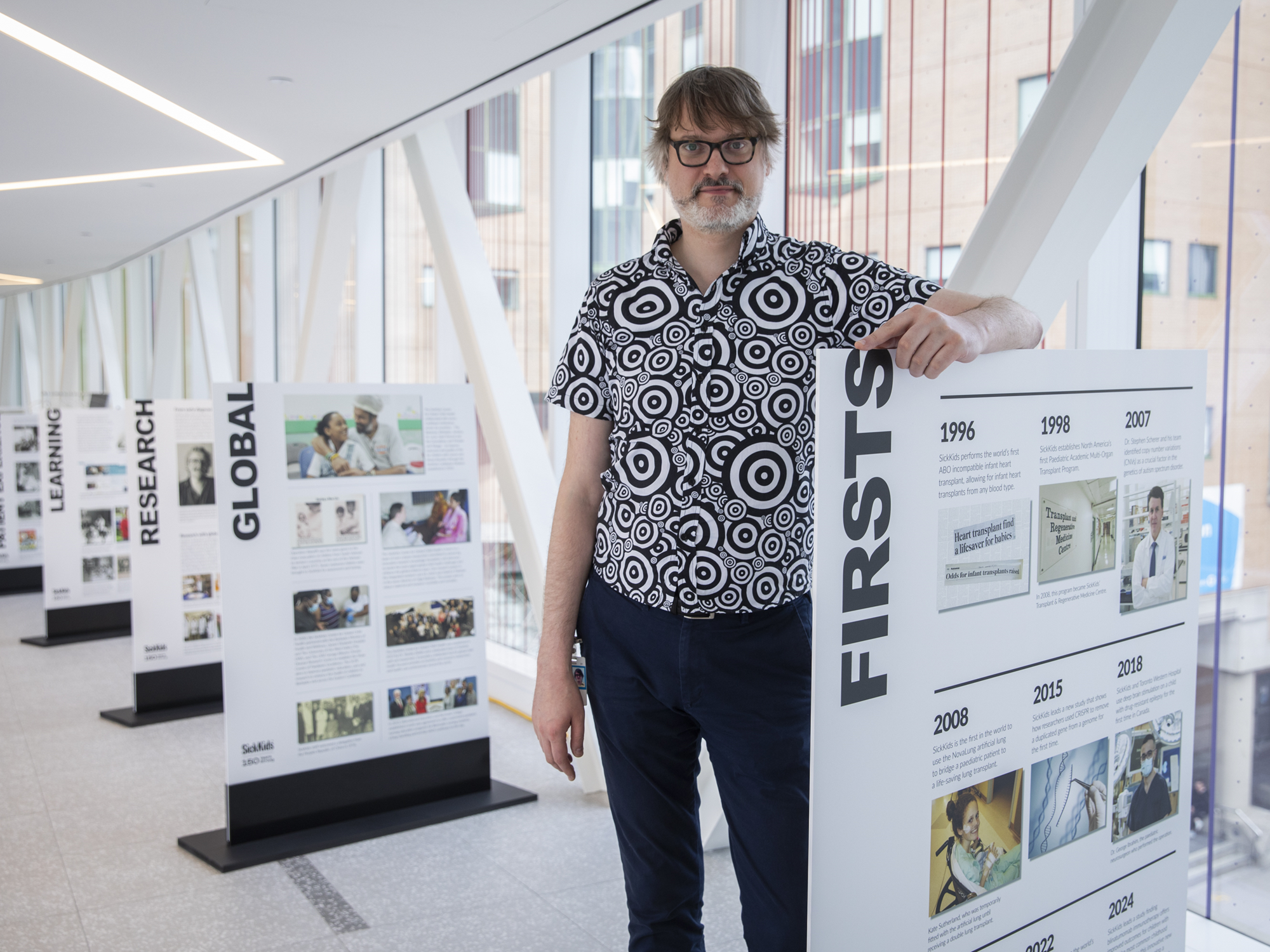An archivist's tale: SickKids’ history keeper David Wencer goes on the record
Summary:
In recognition of International Archives Day, archivist David Wencer traces his path from SickKids volunteer to SickKids walking encyclopedia.
The Hospital for Sick Children (SickKids) turns 150 this year, and the SickKids Archives and the organization’s storied legacy are central to the celebrations. In recognition of International Archives Day, archivist David Wencer shares what it’s like preserving and managing the historical documents, artifacts, and heritage of SickKids, and traces his path from SickKids volunteer to SickKids walking encyclopedia.

Were you working in archives before coming to SickKids?
Not exactly. I was involved in doing local history research and writing. I helped work on things like walking tours and historical plaques, and I served on committees that were involved in heritage preservation, while also doing freelance writing for print and online. I learned a lot about Toronto’s history because, as I was churning out stories, I had to spend many hours in several local archives doing research. And while I was doing all that, I started to think maybe I could work on the other side of things, and pursued studies in archives and records management.
What brought you to SickKids?
I started volunteering at SickKids a few hours a week in the Archives while continuing to work and broaden my work experience elsewhere. My mother looked after the Archives as part of her role in the Health Sciences Library, but it was only half of her job when she worked here. After she retired, SickKids decided it needed a full-time archivist. So I applied, interviewed for the position, and was offered the job. That makes me SickKids’ first full-time archivist.
Does that surprise you?
Not really. The SickKids Archives were actually in the hands of the Women’s Auxiliary Volunteers (WAV) from the 1970s until the early 2000s when it became a formal program and transferred to the Health Sciences Library. I feel indebted to the WAV for their work in collecting and organizing the first records, as I still rely on some of their files to this day. They did a lot of important heavy lifting in the early days. But the collection has grown a lot in recent years, and I think the 2010s is when the Archives became a full-time job.
What were your priorities when you started the job?
When I was first hired, I lacked the institutional knowledge that I've developed over the last 13 years. I didn’t know SickKids’ history yet so there was some studying to do. I also find with my job that there's often things where I need to figure out who I need to ask, or who the relevant people are in each department. And I had to acquaint myself with all the different back-end resources of the Archives so that I can try to find information; some of these were digital when I started and some were still in card catalogue form. In my first year or two, I was involved in trying to learn about all of these things, while receiving new donations or processing the backlog of old donations and trying to get stuff into our databases so everything was findable.
What is a typical day like for an archivist?
It can vary depending on the size of the organization and how many archivists there are. In my case I am the only one so I get to do a little bit of everything. Much of my work involves answering reference requests that have come in from various audiences, including staff, current and former patients and families, academic researchers, and journalists. But at the same time, I’m receiving and processing donations of documents and photographs and artifacts.

David Wencer dug out a couple of old nursing uniforms that were put on display during SickKids’ birthday celebration on April 3.
What is the best part of your job?
The best part of my job is that there isn’t a typical day since I work on a wide variety of tasks. Some days I think I know what my day will look like until an unusual question comes in. Then my day goes off into an unexpected and often delightful direction.
Do you have an interesting anecdote about a donation?
So, one time I received a call from the family of a former SickKids orthopedic surgeon. The family had just finished cleaning out the house after their parents passed away. They were literally on Highway 401 on their way to the dump when it occurred to them that maybe they should check with SickKids to see if we wanted any of their dad’s old papers and teaching slides. They managed to reach me by phone and I met them half an hour later in the driveway out front, where I discovered a treasure trove of information related to their dad’s scoliosis research from his many trips overseas. There was a lot of interesting material in that donation, including a plaster cast of a spine that’s presently on display in the PGCRL. I was glad I took that call!
On April 3, the day SickKids was founded, there was a 150th birthday celebration held on the campus. What was that like for you?
Well, April 3 is my birthday as well, which made the festivities extra special for me. From an archivist’s perspective, it was super fun and interesting because it's relatively rare that there's this much continuous focus on SickKids history. The event was an opportunity to highlight our rich heritage and the stories we want to tell, both physically and digitally. I’ve never before fielded so many questions on aspects of our history at one time. With the help of many others, including the Creative Services team, this resulted in the creation of a set of archival display boards located throughout SickKids, which was also posted online in a new digital archive on sickkids.ca including SickKids Firsts. There is also the SickKids Foundation project with the 150 balloon sculptures each boasting a significant SickKids historical milestone. Overall, it was incredibly satisfying to distill 150 years of history and tell our story.

What has been your favourite SickKids 150 moment so far?
There were many special guests who were part of the April 3 event, among them several descendants of our founder, Elizabeth McMaster, who were painstakingly tracked down by our friends at SickKids Foundation. I never thought I would come face-to-face with her heirs, and there I was giving them a tour of the campus. They are the loveliest and most incredible people, and they kindly shared some photos of Elizabeth that I had never seen before and hope to add to the Archives in the near future. Our Archives only has one image of Elizabeth McMaster where she is dressed as a nurse and holding a tray, and it’s blurry around the edges. Up until I met her family, she was sort of this almost mythical figure in my head, and then seeing her in photos with her own children helped me see the humanity in her and what she was trying to accomplish. I could see her descendants were in awe and probably didn’t understand exactly what Elizabeth McMaster had set in motion until they arrived here and saw what a magnificent place SickKids is and experienced our remarkable celebration.
What’s in store for the archives in the future?
Something I’m hoping to start this year is an oral history project. I’d like to ask former SickKids staff to talk on camera about some of the highlights or challenges of their career and get a little bit more information about how things actually happened, beyond the high-level explanation that may be documented elsewhere. In my job I’m not typically asked to retrieve a box of papers for people; instead I’m asked what information we have about this or that. What I’ve realized is that the official records don't always give as complete an answer as it would be if you could just talk to a person and hear what they have to say. It’s this knowledge that I would like to capture and preserve and share for future generations.

To learn more about the SickKids archives or contact information, visit the Archives page on sickkids.ca.

